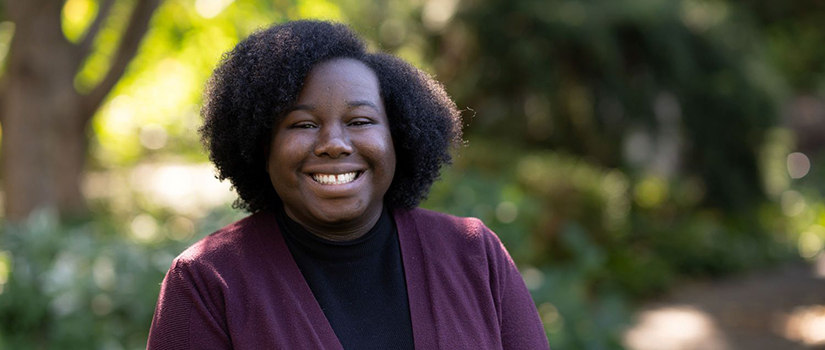Top image: Patrice Green earned her Master of Library and Information Science in 2019.
Not everyone would be excited to examine a rusty filing cabinet in the basement of a 100-year-old boarding house. But, for MLIS alumna Patrice Green, ’19, it is a potential treasure trove of information that could fill in gaps in the historical record. Assessing the contents of this particular cabinet, among several others in various states of wear, was also one of her first tasks at a new job.
On July 31, Green started as the curator for African American and African Diasporic Collections at the Schlesinger Library on the History of Women in America, based at the Harvard Radcliffe Institute for Advanced Study.
In this position, Green hopes to combat entrenched narratives by sharing the voices of Black, indigenous and LGBTQ+ individuals who have been excluded from many archives and collections. She will make decisions, with a critical eye, about what materials to add to the collections she curates, ensuring that they are productive sources for research.
“From my perspective, this role focuses on the primary sources — archival collections, records from individuals or institutions, or oral histories — of Black women, including Black and non-binary or transgender people,” says Green.
As part of the curatorial team, Green will work to determine whether adding items to a collection is ethical and useful. Collections come to the Schlesinger from all over the world, and like most other repositories, they can’t accept everything. They can, in some cases, point potential donors to other archives more appropriate to host those stories and steward them effectively with intention and care.
The direct and indirect erasure of cultural heritage is another issue that Green will address in her new position.
“When people migrate or are forcibly trafficked to what is now the United States, there is still an overwhelming pressure to assimilate under the guise of fitting in with American society. That assimilation — ‘don't do these dances, don't sing these songs, don’t speak these languages’ — causes harm and distances people from themselves and their own cultural heritage,” says Green. “Figuring out how to navigate that sort of indoctrination is something I’d like to investigate further.”
Although Green completed her studies before Augusta Baker Chair Nicole Cooke started her tenure at USC, the two have become acquainted through conferences and other professional development opportunities. Green is glad that Cooke joined the faculty at the School of Information Science because her expertise in critical cultural information studies adds a dimension to the MLIS degree that was missing when Green was in the program.
“We’ve had a couple of phone conversations and I've been following her work, especially on fake news and critical cultural information literacy, for the past couple of years,” says Green.
She sought advice from Cooke about potential doctoral studies in the future, but for now Green is content to settle into her position at the Schlesinger Library and see what impact she can have there.
“Cultural knowledge justice is something that I'm very, very much interested in,” Green says. "And I'll be honest with you, I don't know that working at an Ivy League school is going to solve any problems about generational information practices. But at the same time, I do know that making space for people who are Black, people who are indigenous, people who are disabled, etc. to actually tell their stories and be taken seriously is what I'm really aiming for.”
